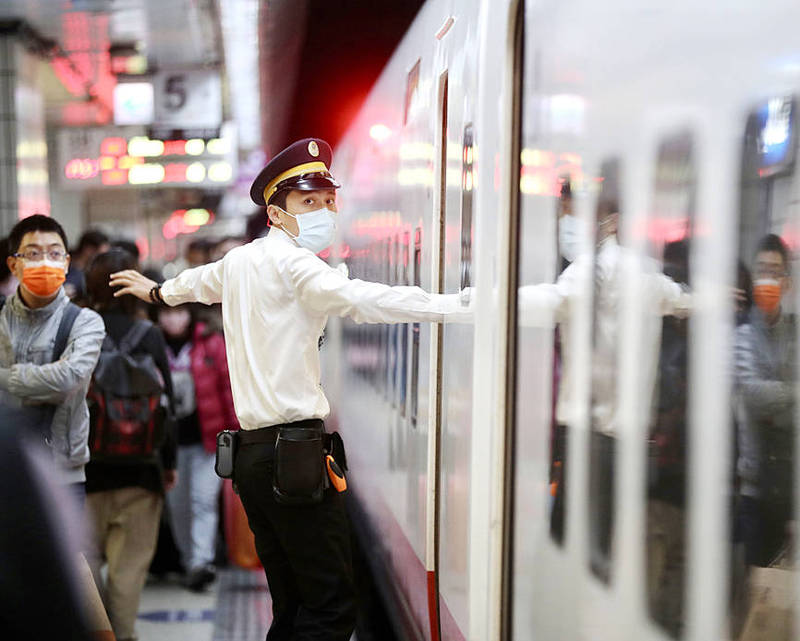《TAIPEI TIMES》 Public not on unions’ side, society says

A Taiwan Railways Administration employee attends to a train at Taipei Railway Station on April 15. Photo: CNA
LEGITIMATE PROTEST? The Society of Railway and National Planning said that the unions should have lobbied for fair ticket prices, not the covering of the TRA’s debt
By Shelley Shan / Staff reporter
The unions that cover Taiwan Railways Administration (TRA) employees lack a convincing argument to persuade the public that their strike planned for Sunday is a legitimate action protesting the government’s plan to turn the TRA into a corporation, the Society of Railway and National Planning, Taiwan said over the weekend.
All three labor unions — the Taiwan Railway Labor Union (TRLU), the National Train Drivers’ Union and the Taiwan Railway Union (TRU) — have asked their members to not go to work on International Workers’ Day on Sunday to protest against a plan by the Ministry of Transportation and Communications to restructure the TRA from a government agency into a state-run corporation.
As all train services on Sunday, including tourism trains, would be canceled, the ministry on Friday announced a series of measures to mitigate any inconvenience that travelers might experience during the International Workers’ Day long weekend.
TRA Director-General Du Wei (杜微) in a statement yesterday apologized to the public for the inconvenience, adding that the agency would waive the processing fee for people seeking ticket refunds.
Today, Minister of Transportation and Communications Wang Kwo-tsai (王國材) is to oversee the first drill conducted at Taipei Railway Station in preparation for Sunday’s strike.
The society said that the main issue leading to the strike is whether the government should assume all of the TRA’s accumulated debts, as demanded by the unions.
“We are not siding with the ministry or the Executive Yuan, but the government budget to be appropriated to cover the TRA’s accumulated debts is taxpayers’ money. As the government has not adjusted TRA ticket prices for more than 20 years, the budget would return money that the railway agency should have earned over the past 20 years in one payment,” it said.
The unions criticized the Executive Yuan’s reluctance to assume all of the TRA’s debts, but they are demanding that the government use taxpayers’ money to fill up the TRA’s “financial black hole,” the society said.
Instead, the unions should have highlighted a reasonable ticket pricing scheme, which should have been regularly adjusted based on the consumer price index and affordability to railway passengers, it added.
The development of the TRA’s assets and properties also lacks flexibility, the society said.
“Once the TRA becomes a state-run company, it will have the flexibility it needs to develop its assets and properties, and turn them into diverse side businesses,” it said.
The unions could have gained public support for their cause if they had effectively overseen the TRA and raised railway safety issues with the ministry, the society said.
“However, when we were tasked to examine the TRA’s operations based on 144 issues identified by the Executive Yuan after the 2018 Puyuma Express derailment, we found that the TRLU and the TRU had failed to oversee work safety and service quality at the agency. Now the two unions want their voices heard when the ministry is corporatizing the agency,” it said.
The TRA’s culture of “slacking off,” the result of years of financial losses, has compromised the safety of its employees and passengers, the society said.
“The unions are using the strike to inconvenience passengers and hold the passengers hostage to satisfy their own demands, which is paradoxical,” it said, adding that strike organizers should win public approval by presenting a more convincing argument.
Organizing a strike is a double-edged sword, the society added.
“When the Japanese government privatized the national railway service in 1987, the public and lawmakers were originally on the side of the labor union, but they agreed with the policy of privatization after the union paralyzed the railway services a few times,” it said.
新聞來源:TAIPEI TIMES
















